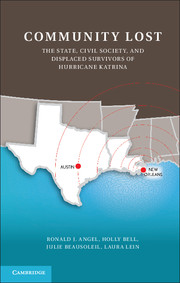Book contents
- Frontmatter
- Contents
- Acknowledgments
- Introduction
- 1 After the Storm
- 2 An Emerging Methodology for a Crisis Situation
- 3 Life before the Storm
- 4 Evacuation and Arrival in Austin
- 5 The Limited Transportability of Social Capital
- 6 Civil Society, NGOs, and the Grassroots Response
- 7 Housing, Employment, and Identification
- 8 Health Care and the Limitations of Civil Society
- 9 The State, Civil Society, and the Limitations of Social Capital
- Bibliography
- Index
4 - Evacuation and Arrival in Austin
Published online by Cambridge University Press: 05 June 2012
- Frontmatter
- Contents
- Acknowledgments
- Introduction
- 1 After the Storm
- 2 An Emerging Methodology for a Crisis Situation
- 3 Life before the Storm
- 4 Evacuation and Arrival in Austin
- 5 The Limited Transportability of Social Capital
- 6 Civil Society, NGOs, and the Grassroots Response
- 7 Housing, Employment, and Identification
- 8 Health Care and the Limitations of Civil Society
- 9 The State, Civil Society, and the Limitations of Social Capital
- Bibliography
- Index
Summary
In October 1998, Hurricane Mitch, a category five storm, killed more than eleven thousand people and left millions homeless in Honduras, Nicaragua, Guatemala, and El Salvador. Twelve years later in January 2010, a magnitude seven earthquake struck Haiti ten miles west of Port-au-Prince, causing thousands of deaths and leaving millions more homeless. These were but two of numerous natural and man-made disasters that have cost the lives and livelihoods of millions of people all over the world in the recent past. Despite their differences, though, disasters share one common feature: they cause the greatest suffering among those who have the fewest possibilities of escape and the fewest resources with which to recover. It may not be surprising that this is the case in the developing world or in an impoverished nation such as Haiti, but as we showed in the last chapter, it was also true in New Orleans. In Louisiana, the suffering of those who were most affected cannot be attributed solely to nature’s wrath; it was an almost inevitable result of governmental policies that placed the victims in harm’s way, that left them with few avenues of escape, and that undermined an adequate governmental and civil society response to the longer-term crisis.
Economic crises, like disasters, also take their greatest toll on those with the fewest resources, whose vulnerability is largely determined by governmental policies. In the wake of the debt crises that racked Latin America in the 1980s, lending institutions, including the International Monetary Fund and governments in rich lending nations, forced drastic macroeconomic adjustment policies on the affected nations. In addition to market and currency reforms, these included sharp cuts in public spending and social services (Brown & Hunter, 1999; Thorp, 1998). The result was the loss of the minimal safety net upon which the most disadvantaged citizens relied. Although serious fiscal austerity and retrenchment may be unavoidable economic realities when dealing with major economic crises, as in the case of disasters, the pain is never borne equally by everyone; the rich never make the same proportionate sacrifice as the poor. As in Latin America, the serious underfunding of public programs that has occurred in the United States in recent years has inevitably had its greatest impact on those most dependent on public programs.
- Type
- Chapter
- Information
- Community LostThe State, Civil Society, and Displaced Survivors of Hurricane Katrina, pp. 80 - 99Publisher: Cambridge University PressPrint publication year: 2012



